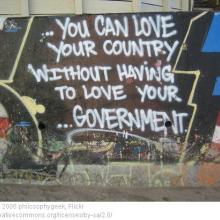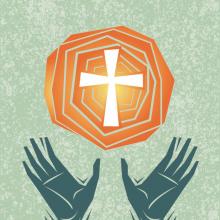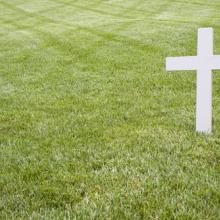the nones
I don’t know what shocked me more: The fact that actor Rainn Wilson — best known for his role as Dwight Schrute on the hit TV show The Office — had written a book about religion and spirituality or that I was able to interview him.
I am a millennial and for many of us, “spirituality” means being “spiritual but not religious.” I’ve heard my peers say things like, “I’m looking for spiritual healing,” or “I’m trying to find God for myself,” or “I’m wanting to get in touch with my own divinity,” or “I contain multitudes.” Perhaps there’s a kernel of truth in some of those statements but the thing that stands out to me is this: It kinda just comes off as individualism baptized in “holy” hyperbole.
What I appreciated about Wilson’s Soul Boom: Why We Need a Spiritual Revolution (out April 25) is that it offered a gentle critique of this version of individualized spirituality. For Wilson, who is a member of the Baha’i faith, spirituality has a larger purpose beyond the self. Spirituality gives us eyes to imagine a society based on “justice, equity, love, and a reduction in unnecessary pain for the inhabitants of our beautiful planet. To build the kingdom of God on Earth,” as he writes in the book. So, from this perspective, seeking inner peace should not only lead to spiritual tranquility but also public tranquility. If this is what pure and undefiled spirituality might look like, then color me intrigued.
Wilson and I talked about topics ranging from cultural appropriation and Christian representation in the media, to communism and how religion is portrayed in The Office. Considering all the topics touched on in Soul Boom, it only seemed right to cast a wide net during our conversation.
The Heretic, a new documentary about controversial author and thinker Rob Bell, offers a new image of Christianity and faith. The film traces Bell’s work since the release of his hair-raising book, Love Wins: A Book About Heaven, Hell and the Fate of Every Person Who Ever Lived, which questioned the damnation of human beings to hell.

Photo via Lightspring / Shutterstock.com
The culture wars have always been with us. Conservatives start them. And liberals win them. So argues Stephen Prothero in his new book Why Liberals Win the Culture Wars (Even When They Lose Elections).
Prothero recently spoke with Sojourners about this argument, its impact on liberal activism, and how we can better wage the culture wars. This interview has been edited for length and clarity.
Earlier this month, NFL star Arian Foster, a running back for the Houston Texans, sent ripples through the world of professional football when he came out as a nonbeliever in the pages of ESPN Magazine.
Though he is not exactly an atheist — Foster told reporter Tim Keown he shuns that label and believes in "nothing" — Foster offered a counternarrative to the overwhelmingly Christian world of professional football and the college football system that feeds it.
"Everybody always says the same thing: You have to have faith," Foster, who is 28, says in the magazine.
While there are certainly other football players with nontraditional religious beliefs, Foster is the only active professional football player who has been open about his nonbelief.
I have been in this conversation like many others, excited about a future of possibility. And yet it occurred to me that I forgot to do something in all of this panic and evaluation and re-visioning.
I forgot to say I’m sorry.
1. D.C. Metro Bans ‘Issue Ads’ after Pamela Gellar Submits Prophet Muhammed Cartoon Ad
Gellar, who leads the group that organized the ‘Draw Muhammed’ cartoon contest that prompted a shooting in Texas, submitted the winning drawing to run as an ad in the Washington, D.C. metro. According to the WMATA, that will not be happening.
2. Killing It: Nebraska’s Ban Another Sign of Decline in Support for Death Penalty
“A growing number of Republicans have recently taken up the cause of banning the death penalty in Nebraska and other states. They argue that it is inefficient because it does not deter murderers, is more expensive than imprisonment for life thanks to the costly trials and lengthy appeals, and is at odds with Christian morality.”
...
According to a new study from the Pew Research Center, there are markedly fewer Christians and more “nones” — those who identify of no faith at all — in the U.S. than just seven years ago.
In the wake of this news, many critics have lost themselves in the question of who’s winning. But this isn’t a crisis. We don’t need to defend ourselves. We don’t need to obsess over whose team is in the lead.
But we also can’t just shrug our shoulders. If we have any faith that Christianity has value in the public sphere, we should be reasonably concerned when people begin to see little importance in Christian identity.
This week’s headlines regarding the latest Pew report about the changing religious landscape in the US have gotten me thinking about my own journey with religion, especially as the discussion continues to emphasize the growth of the 'Nones' – the religiously unaffiliated who are said to now make up about one-fifth of the population and outnumber Catholics and mainline Protestants.
Almost eight years ago, I showed up to work at Sojourners for the first time as a member of Sojourners’ Intern Cycle 24. It saved my faith and it changed my life.
If interfaith marriages are supposedly doomed, Dale McGowan’s should have been toe-tagged from the start.
He’s a committed atheist; his wife comes from a line of Southern Baptist preachers. Yet 23 years and three kids later, they are still happily married.
“The key is to talk about your values,” McGowan said from his home in Atlanta. “A lot of time we mix up the words ‘values’ and ‘beliefs.’ Beliefs are what you think is true about the universe. Is there a God? Where do we go when we die? But values are what you believe are important and good. When you get couples talking about values they find out they share a tremendous amount, even if they don’t share beliefs.”
That’s what McGowan and his wife, Becca, did. While she believed in one God, she did not believe salvation could be had only through belief in Jesus. And he agreed that he could go to church with her — and did, for many years, with their children.
To the Dying Church,
I hardly know what to say. Watching someone you love, who helped raise you, who cared for you when you weren't well, who partially defined who you would be, slowly perish before your eyes is difficult to say the least. I love you. I don't want to lose you.
But, this is life. These things happens. Those you love do die. It's just how it works. I mean, there were churches before you. They may not have looked like you or sung songs like you or taught exactly what you do, but they all had Love – just different ways of expressing it. They changed people's lives. They made some people better people and, sometimes, they made people worse people. Then, they died.
In all of it, Love was there somewhere hoping to be valued, hoping to be expressed, hoping to be shared.
Standing at the foot of your bed as you struggle to hold on, fight to catch a few last breaths, is uncomfortable and wonderful, all at the same time. Remembering the twinkle in your eye from my childhood, the liveliness of your step is as beautiful and heartbreaking a thing as I can think of in this moment.
Death sucks.
To the dying church,
The ongoing decline of American Christianity is well documented. A quick Google search of “mainline decline” provides statistics, commentary, and variously tried and discarded solutions related to the struggles of liberal protestantism in the United States. More recently, these trends are showing up in conservative Christian circles as well. The attention of the media, religious scholars, and cultural warriors has been captured by the rise of the “nones,” the “spiritual but not religious,” humanists, and evangelistic atheists.
It is clear who’s ascending and who’s falling. Organized religion is doomed. You, dying church, are in trouble.
I have seen your sickness up close. The congregation where I was baptized — once full on Sunday mornings — now barely hangs on. The church where I preached in college has long since closed its doors. My pastor friends spend their days worrying about shrinking worship attendance and a lack of financial resources for carrying out their ministry. Denominations pause from fighting and splitting just long enough to make budget cuts and lay off staff.
What can be done? What should be done? Is this a new reality that we simply must accept?
While it's not uncommon to hear the terms "Tea Party" and "libertarian" uttered in the same descriptor, a new survey shows the gap between the two movements. According to the new American Values Survey, an annual release from the Public Religion Research Institute, a full 61 percent of libertarians do not consider themselves part of the Tea Party.
“While conventional wisdom has assumed that the Tea Party movement is fueled by libertarian convictions, most libertarians see themselves as outside of the Tea Party movement. Notably, libertarians are also half as likely as those who identify with the Tea Party movement to see themselves as part of the older Christian right movement," said Dr. Robert P. Jones, CEO of PRRI, in a news release.
In fact, only one in five libertarians claim affiliation with the religious right or conservative Christianity — a claim that more than half of Tea Party adherents would make.
We're all exploring and asking, "What's next?" This particular question serves us well when we ask where our young people are.
"What's next?" and the related, "Who will take us there?"
So, this morning I was primed and ready to read "What Millennials don’t want from the church" by Rachel Sloan. It's a quick and worthy missive in which she says, "The most frustrating part of being a Millennial is that my church does not understand me." What specifically doesn't the church understand? Well, "Millennials (despite the terrible things you are told to believe about us) want real authentic, worship and real, authentic churches. We want churches that want to have a relationship with us."
Having made the same mistake many, many times, this time I decided to get my Millennial friends to chime in on the post. Some rightly reminded me that speaking on behalf of any one generation is an impossible task and presents certain rhetorical problems.
The top religion story of 2012 was the “rise of the ‘Nones’” — the one in five adults in the U.S. eschewing any religious label. That trend is now evidenced across the American religious spectrum, including in Jewish communities. About 22 percent of Jews now describe themselves as having no religion, according to a new Pew Research Center survey of U.S. Jews.
“Fully a fifth today of Jews in the United States are people who say they have no religion. They’re atheists, agnostics, or, the largest single subgroup, nothing in particular,” said Alan Cooperman, co-author of the study.
The trend of disaffiliation mimics that of other backgrounds, particularly by age. For example, 93 percent of Greatest Generation Jews (those born between 1914 and 1947) identified as being Jewish by religion, while only 68 percent of Millennial Jews (those born after 1980) say the same.
Expressions like "the world is getting worse and worse" and "we are living during the end times" are commonly thrown around within evangelical circles, and it needs to stop.
Are things really getting worse? Sure, church attendance might be down, fewer people are identifying themselves as 'Christian' on surveys, and the percentage of atheists continues to rise, but that doesn't mean the apocalypse is right around the corner.
Yet, I continually hear pastors and Christian leaders lament these evil times and Depraved Generation. They emotionally and emphatically condemn this fallen world and seemingly fulfill their own false prophecies by promoting a pessimistic outlook of the future of Christianity — simultaneously validating their theories by judging our future of Christianity: the youth.
The common scapegoat for Christianity's current “demise” is often blamed on young people, who are stereotyped as being more liberal, progressive, post-modern, and susceptible to spiritual relativism than ever before. They're the ones who have bought into the lies of the Emergent church, the temptation of the Prosperity Gospel, the sinfulness of our media-saturated world, and have become addicted to entertainment and denied the inerrancy of Scripture.
I am an evangelical.
But what does that label even mean anymore?
A few days ago I was sitting around chatting with a few new friends at my Bible college. One of them was a young Canadian and another was a middle-aged former U.S. soldier. We ended up on the topic of politics and how many companies and businesses in the United States give millions to political and social causes and somehow we ended up talking about McDonalds.
My USAF friend made the statement: “McDonalds is terrible because it gives millions to causes and organizations that you [speaking of me] directly oppose: LGBTQ rights campaigns, Planned Parenthood, etc.” I was taken aback because my new friend simply assumed that because everyone in this conversation was an evangelical meant that we all held a certain set of political ideals and social standards. For him — for millions of others — evangelical meant something far more than a theological persuasion. In the midst of this awkward moment, I decided to reveal my identity as a politically progressive/liberal evangelical, which automatically caused an immense amount of tension to arise in our conversation. How could I, a Bible-believing evangelical, possibly support the LGBTQ community’s right to marry? How could I think that Planned Parenthood was doing any good and that President Obama’s plan to rapidly decrease the numbers of abortions in the United States was progress in any way? Let’s just say that the conversation ended on a pretty tense note.
This encounter really caused me to re-reflect on the magnitude that the term evangelical has been hijacked by political and social agendas over the past decade and how a new generation of evangelicals is emerging that does not at all identify with any of the social and political baggage that has come to represent evangelical Christianity. Which brings me back to my original question: What does the label evangelical even mean anymore?
I can tell you this — it doesn’t mean that I am a Republican. It doesn’t mean that I am a Democrat. It doesn’t mean that I am pro- or anti-anything.
Out of nowhere, I felt an urge to listen to Willie Nelson’s epic album Stardust, a collection of pop standards that went platinum when it was released in 1978.
As I listened to “Blue Skies” and “On the Sunny Side of the Street,” I remembered buying this album for my father. I thought he would enjoy a fresh take on these songs of his youth, his travails during the Great Depression, and the war that defined his generation.
I don’t think he ever listened to it a second time. He loved the songs, but he couldn’t bear the fresh take. He wanted Gertrude Lawrence, the original voices of Tin Pan Alley and Depression-era hopefulness, the crooners that carried his generation to war and back home again.
I understand. The music we hear at our first dreaming, first love, first dance becomes the soundtrack of our lives.
For many people, the same is true of faith. Our images of God, songs of worship and language of prayer tend to be those we acquired at first awareness. Many more images, songs and words will come later, but none might resonate so deeply as those that were imprinted on us early on.
For over half a century, Gallup has been asking Americans whether they think the influence of religion is increasing or decreasing in the U.S., posing the intriguing question of what the results actually signify.
For starters, it’s worth bearing in mind that Western civilization is grounded in the belief that once upon a time, God was in his heaven and people went to church regularly. So at any given time, more Americans are likely to think the influence of religion is in decline than the other way around.
That said, what accounts for the rather striking ups and downs in the chart? In its latest release, Gallup emphasizes that these do not reflect changes in personal religiosity — and I’m inclined to agree, up to a point. Here’s the story I’d tell about the people’s perception of religion’s influence.















